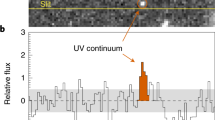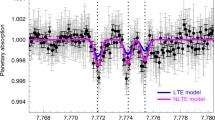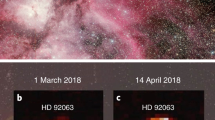Abstract
ALTHOUGH the two well-known lines of [O III] λ=5007 A. (3P2–1D2) and λ = 4959 A. (3P1–1D2) are the most prominent features in the spectra of planetary nebulæ and novæ at the nebular stage, the third line of the triplet, corresponding to the3P0–1D2 transition, for which the calculated wave-length is λ= 4931·8 A., has not been generally observed. Recently, however, Bowen and Wyse1 attributed to the3P0–1D2 transition the faint line which they observed in the spectra of the nebulæ N.G.C. 7027 and N.G.C. 6572.
This is a preview of subscription content, access via your institution
Access options
Subscribe to this journal
Receive 51 print issues and online access
$199.00 per year
only $3.90 per issue
Buy this article
- Purchase on Springer Link
- Instant access to full article PDF
Prices may be subject to local taxes which are calculated during checkout
Similar content being viewed by others
References
Public. Astro. Soc. Pacific, 51, 348, (1938).
Z. Astrophys., 13, 36, (1936).
Public. Obs. Michigan, 6, 201, (1936).
Lick Obs. Public., 14, Part 3, 207 and 208 (1939).
Atlrophys. J., 79, 217, (1934).
Public. Astro. Soc. Pacific, 51, 160, (1939).
Author information
Authors and Affiliations
Rights and permissions
About this article
Cite this article
DUFAY, J., BLOCH, M. The Forbidden 3PO–1D2 Line of O III in the Nebular Spectrum of Nova Herculis 1934. Nature 144, 593–594 (1939). https://doi.org/10.1038/144593b0
Issue Date:
DOI: https://doi.org/10.1038/144593b0
Comments
By submitting a comment you agree to abide by our Terms and Community Guidelines. If you find something abusive or that does not comply with our terms or guidelines please flag it as inappropriate.



